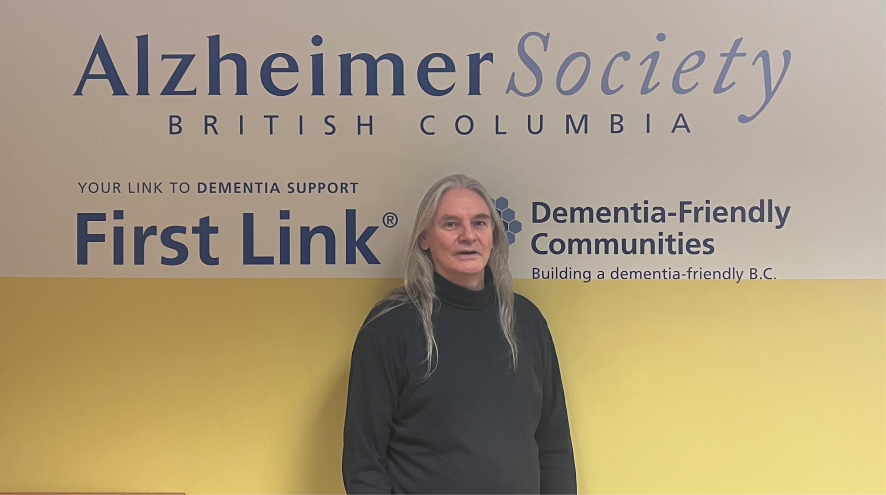Awareness Month 2023: Ian
Meet one of the British Columbians sharing their stories as part of Alzheimer’s Awareness Month this year.

One in two British Columbians believe that a dementia diagnosis means the end of a meaningful life – but this isn’t the case at all. Throughout January, the Alzheimer Society of B.C. is recognizing Alzheimer’s Awareness Month by flipping the script on stigma associated with dementia and highlighting amazing individuals on the dementia journey who continue to find moments of joy, peace and happiness despite the many challenges of the disease. British Columbians affected by dementia continue to live full and meaningful lives, showing those around them to enjoy today.
Among those sharing their story is Ian of Surrey, B.C. The morning Ian hopped on a call to share his story with us, his mother had just left to go to her senior day program, one of many programs Ian discovered through his connection with the Society. Ian, who has lived with his mother since 2017, acknowledges the degree of sacrifice in supporting his mother’s ability to age with choice. “At first I was able to get more done with my work, but nowadays I accomplish shockingly little. But, among the many rewards are the time and engagement I get to have with my mum. There’s an importance of the routine. It’s important for her and helps us both,” he says.
Ian first became concerned about his mother when he was living in London, England, where he hosted sessions with the Gay Authors Workshop and co-founded a LGBT small press, which ultimately led to his appointment in 2005 as Secretary General for Literature to the International Lesbian and Gay Cultural Network. He started noticing changes in his mother’s personality and behaviour during their weekly phone calls.
At the time, Ian’s father was on the Sunshine Coast and also living with dementia. Having been abroad for 15 years, Ian moved back to B.C. to help his family. A handful of educational sessions, specifically set up for gay men as part of the U.K.’s National Health Service’s community outreach across Britain, had given him some basic tools as a caregiver. Once back in B.C., he wasted no time finding that support again.
“Hearing about the LGBT support group cemented my relationship with the Alzheimer Society of B.C.,” says Ian. Once connected, he took advantage of many other programs, including in-person training classes and online webinars, support groups and the First Link® Dementia Helpline. “The Helpline is really great, especially when I was in Gibsons. It’s people’s first link, that first point of contact when starting the dementia journey.”
At the end of his life, Ian’s father lived in long-term care, where he died in 2018. While his father had a diagnosis of Alzheimer’s disease, Ian’s mother does not have any official diagnosis. She’s had regular tests done by their family doctor and was referred to a gerontologist. But, when the time came for his mom to get a CT scan to better assess those diagnostic metrics, she was fearful and wouldn’t go.
The biggest misconceptions Ian has faced have been from close family. He’s been told his mother should be in a care home because she’d be happier there. Family members long dismissed her decline, chalking it up to poor mental health. And eventually, many people have simply stopped visiting and coming around. “I just wish more people understood how important it is to continue to see the person, to engage with them as you normally would. To just be yourself, to still talk to them, to visit and to not change,” Ian says.
As an openly gay man – and recipient of the Federal Government’s Canada Pride Citation – Ian is no stranger to misconceptions and stigma. He hopes sharing his experience can help bring broader representation into the dementia community, to highlight not only the diversity of caregiving relationships but also the differing needs of people living with dementia. He hopes to see more discussions around specific support needs for people within the LGBTQ2S+ community facing dementia, including the future possibility of LGBTQ2S+ care homes. The LGBTQ2S+ dementia caregivers support group being available virtually and in person is a great start, but he hopes more dementia outreach and education within the community will make these discussions possible.
For now, though, Ian takes things day by day. On a typical night, he and his mum will eat dinner, watch the news, Wheel of Fortune, a rerun of M*A*S*H, a documentary or funny animal videos and then bedtime. On a recent evening, they were watching M*A*S*H and his mother was laughing away. “It was nice to be in that moment. Knowing that mum gets to have a great quality of life and I get to enjoy it with her. That’s the reward for me.”
Learn more about the campaign
Want to learn more? Read some of the other stories being shared throughout the month at alzbc.org/FullOfLife.
